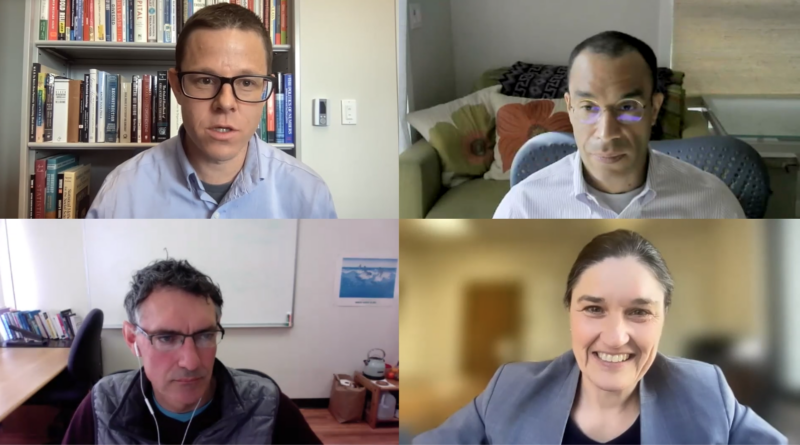On February 3rd, 2022, Social Science Matrix, together with the Center for Studies in Higher Education, hosted an online “Author Meets Critics” panel discussion focused on the book, Bankers in the Ivory Tower: The Troubling Rise of Financiers in US Higher Education, by Charlie Eaton, Assistant Professor of Sociology at the University of California, Merced.
Elite colleges have long played a crucial role in maintaining social and class status in America, while public universities have offered a major stepping-stone to new economic opportunities. However, as Eaton reveals in his book, finance has played a central role in the widening inequality in recent decades, both in American higher education and in American society at large.

Eaton, who earned his PhD from the UC Berkeley Department of Sociology, was joined in conversation by Emmanuel Saez, Professor of Economics and Director of the Center for Equitable Growth at UC Berkeley, and Jonathan Glater, Professor of Law at the UC Berkeley School of Law. The panel was moderated by Jennifer Johnson-Hanks, Executive Dean of the UC Berkeley Division of Letters & Science.
“What I show in this book that’s new is that student loan borrowing is highly unequal across different organizational strata of colleges, and financiers play a major role in these inequalities,” Eaton said in his presentation. “I focus on the divergence of three higher education strata of student debt: at the top elite private institutions, where the fewest students borrow; in the middle are public universities, which enroll 65% of all bachelor’s degree seekers in the US; and the majority of those who borrow are at for-profit colleges, whose students are overwhelmingly working class and disproportionately Black, and whose students have the most debt. How did this divergence occur? My answer is that financiers played a big role in each of these strata.”
Eaton emphasized the role of government policy changes, including tax cuts and financial deregulation, in perpetuating these inequalities, as they allowed financiers to play new roles across the three strata of higher education. “At the top, financiers helped restore elite private universities as the last bastion of debt-free higher education. They did this by partnering with their endowments to exploit tax cuts and financial deregulation. These schools hoarded this endowment boom for their mostly small, privileged, and now debt-free student bodies. At the bottom, financiers took over for-profit colleges en masse to capture public subsidies around federal student loan expansion. In the middle, public universities were squeezed by these tax and subsidy diversions to the top and bottom strata.”
In concluding his remarks, Eaton struck an optimistic tone, noting that “a better future is possible if we mobilize a more diverse and inclusive public university to reimagine finance from below…. More equitable higher education finance is probably only possible as part of a more equitable overall financial system. But public universities can play a central role in advancing such change by connecting people from more varied backgrounds than the Ivory Tower bankers who got us here. In fact, public universities, including Berkeley, are already doing this in many ways.”
 In his remarks, Professor Jonathan Glater agreed that “it is difficult to overstate the corrosive effects of money in the financing of higher education.” Beyond student debt, Glater said, the influence of money in higher education affects credentialing of institutions, as well as the admissions and grading of students, “because students are not paying for C’s, D’s, and F’s, they’re paying for A’s.” It also leads to “inequity of opportunity in the form of increasing student debt, which not only may discourage students, but slows the possibility of socioeconomic advancement for students after they graduate.”
In his remarks, Professor Jonathan Glater agreed that “it is difficult to overstate the corrosive effects of money in the financing of higher education.” Beyond student debt, Glater said, the influence of money in higher education affects credentialing of institutions, as well as the admissions and grading of students, “because students are not paying for C’s, D’s, and F’s, they’re paying for A’s.” It also leads to “inequity of opportunity in the form of increasing student debt, which not only may discourage students, but slows the possibility of socioeconomic advancement for students after they graduate.”
Glater praised Eaton’s book for challenging us to look for alternatives to the status quo. “I would suggest that inequality should be regarded as a symptom… of a broader system — social, financial, ideological,” Glater said. “One implication of this story about people, personalities, relationships, and ideas is that different people with different ideas can implement changes. Dr. Eaton’s narrative implicitly challenges us to ask… can we imagine something else? And of course, we can.”
Professor Emmanuel Saez noted how “higher education has really become the route to economic opportunity,” particularly in the United States, and this has fueled the rise of for-profit colleges. Saez referred to his own past research indicating that “if you reach a good higher-ed institution, you’re very likely to have a good economic success, regardless of your parents’ background. But of course the inequality is in who gets access to the good, higher ed institution. And that’s where the inequality here in the U.S. is truly, truly massive, with the best schools having almost three quarters of their kids coming from the top 10%.”
Saez praised Eaton’s book for exposing the damaging impacts of private equity in for-profit institutions, as they were able to “take control of the schools and change the way they were operating to really further increase the predatory nature of the schools. That government retrenchment, with less funding for community colleges or public school, led to the blooming of the for-profit, predatory school, and that is obviously highly detrimental for for opportunity and for inequality in general.”


